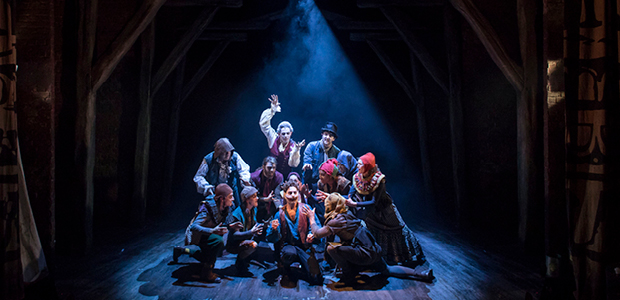Actors Louis Maskell and Sanne den Besten are transported by The Grinning Man
The Grinning Man is not your standard West End theatre experience. ‘It feels like some sort of underground cabaret’, says Louis Maskell, who originated the lead role of Grinpayne when the show premiered in Bristol in 2016, and stars in the London transfer. Jon Bausor’s carnivalesque set design spills off the stage into the auditorium and front of house areas at Trafalgar Studios, bringing you into the fantastical world of the musical before any of the cast have even sung a note. Looming over it all, surrounding the stage, is a huge grinning mouth – it looks like it might just swallow you whole.
Loosely adapted from the Victor Hugo novel The Man Who Laughs, which the French novelist wrote in 1869 while in exile on Guernsey, the show tells the story of a young man who lives with a hideous scar of a smile and no idea how he got it. Set in Lonnn’donnn, a fantastical, fairy tale version of the capital, in the midst of a monarchical crisis, The Grinning Man features an epic and mesmeric score by composers Tim Phillips and Marc Teitler.
An inventive treat for musical theatre fans
‘It sounds like something you’ve never heard before,’ says Sanne den Besten, who plays Dea, the blind girl who was raised alongside, and falls in love with, the orphaned Grinpayne. Den Besten joined the production when it transferred, coming straight to The Grinning Man from playing the lead in Mamma Mia! in the West End. It’s a treat to be working on a new musical, she says, recalling the creativity of the six-week rehearsal period under director Tom Morris. ‘Every person in that room felt that they had the chance to say what they thought and come up with new ideas, and that was really exciting.’
For Maskell, the power of Phillips and Teitler’s music is in the way it ‘propels the story – it’s actually quite rare to find in musical theatre nowadays’. The songs stay with you too, he says. ‘Their tunes are massively hummable and get right into your head.’
Beautiful puppetry, from the team behind War Horse, is another integral element of The Grinning Man, with Maskell and den Besten using puppet versions of their characters to introduce their own moving backstories. Watching the actors expertly manipulate their puppet alter egos, you would never guess that this was their first experience of puppeteering. It was a steep learning curve, says den Besten, but the puppeteering scenes are now some of her favourites of the show.

An incredible story to make you laugh ... and cry
Den Besten also loves the comedy found in The Grinning Man. Her scenes with Maskell are mostly rather serious, as Grinpayne and Dea strive to uncover the secrets of their past, but the exploits of the show’s royal siblings, each member of whom finds him or herself captivated by Grinpayne, in one way or another – have her in stitches every night.
The humour keeps audiences on their toes too, says Maskell. ‘A lot of people come to a Victor Hugo show expecting quite a heavy evening and they are ultimately surprised by how funny it is. That’s Carl Grose, our writer, for you.’ The blend of light and shade has a powerful effect on audiences, says den Besten. ‘That’s why the show is so heartbreaking – because you’re laughing and you’re suddenly hit by this incredible story.’
It’s a story – and a world – that stays with you. Leaving Trafalgar Studios at the end of a performance of The Grinning Man is akin to waking up from a particularly strange and wonderful dream: Lonnn’donnn may not be real, but as you walk down the street away from the theatre, it feels almost like it might be.
Interview by Jo Caird
